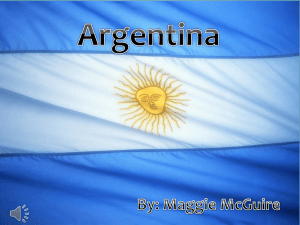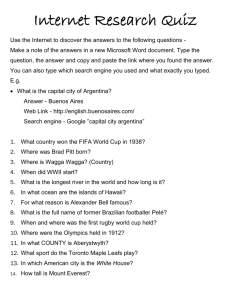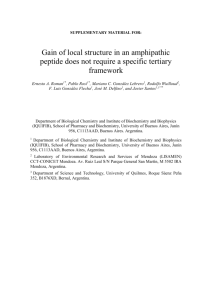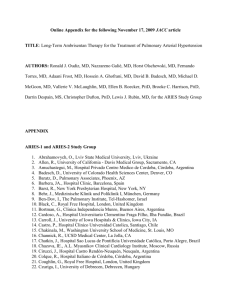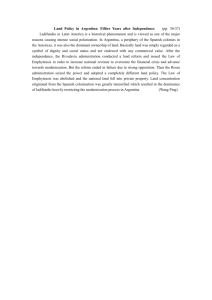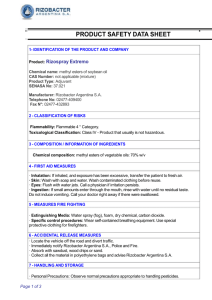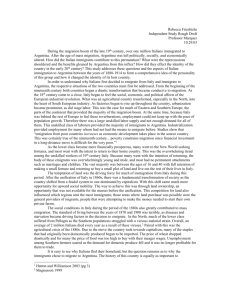ANTH 3001 AFLA - Ethnicity and Multiculturalism in Argentina
advertisement
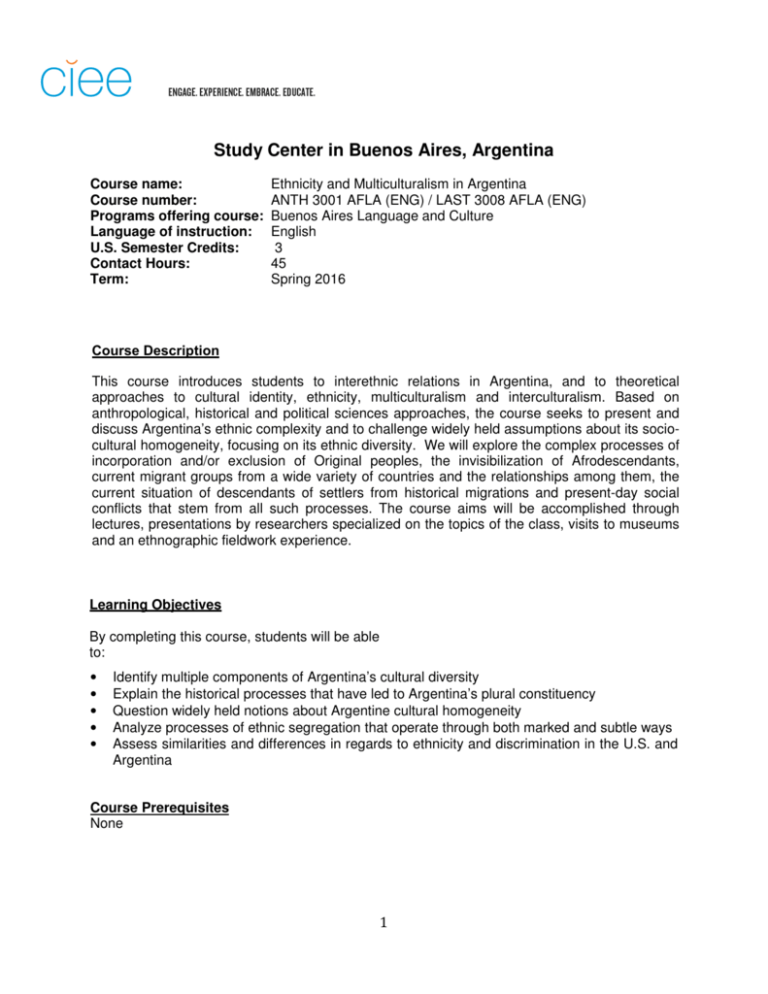
Study Center in Buenos Aires, Argentina Course name: Course number: Programs offering course: Language of instruction: U.S. Semester Credits: Contact Hours: Term: Ethnicity and Multiculturalism in Argentina ANTH 3001 AFLA (ENG) / LAST 3008 AFLA (ENG) Buenos Aires Language and Culture English 3 45 Spring 2016 Course Description This course introduces students to interethnic relations in Argentina, and to theoretical approaches to cultural identity, ethnicity, multiculturalism and interculturalism. Based on anthropological, historical and political sciences approaches, the course seeks to present and discuss Argentina’s ethnic complexity and to challenge widely held assumptions about its sociocultural homogeneity, focusing on its ethnic diversity. We will explore the complex processes of incorporation and/or exclusion of Original peoples, the invisibilization of Afrodescendants, current migrant groups from a wide variety of countries and the relationships among them, the current situation of descendants of settlers from historical migrations and present-day social conflicts that stem from all such processes. The course aims will be accomplished through lectures, presentations by researchers specialized on the topics of the class, visits to museums and an ethnographic fieldwork experience. Learning Objectives By completing this course, students will be able to: • • • • • Identify multiple components of Argentina’s cultural diversity Explain the historical processes that have led to Argentina’s plural constituency Question widely held notions about Argentine cultural homogeneity Analyze processes of ethnic segregation that operate through both marked and subtle ways Assess similarities and differences in regards to ethnicity and discrimination in the U.S. and Argentina Course Prerequisites None 1 Methods of Instruction Lectures; video clips of current living conditions of Indigenous peoples, ethnic festivals, and political demonstrations; field trips to sites such as Ethnographic Museum (Museo Etnográfico, Immigration Museum (Museo de la Inmigración), La Boca neighbourhood, Museo Evita (Evita Museum), Feria de Mataderos; ethnographic fieldnote taking tour in Buenos Aires; guest speakers. Assessment and Final Grade Midterm Exam Written Assignments (3) Final Exam Attendance and Class Participation 30% 30% 30% 10% Course Requirements Midterm Exam Take home. Student will have to answer four questions in essay form. The expected length of the exam is 1500 words. Students will be graded based on the quality of the analysis and the capacity to summarize the main conceptual frameworks of the bibliographic material. Written Assignments 1.) A report on the visit to the Ethnographic Museum focusing on ways of public representation of the Indigenous peoples. 700 words. The students are expected to make a critical reflection on the museum exhibits and on the history of representation of Indigenous cultures. 2.) A Powerpoint presentation on different conceptualizations of “multiculturalism” 3.) An ethnographic record based on notes taken on fieldtrip #3. 700 words. The evaluation of this assignment will assess the student´s ability to link empirical data with the theoretical concepts seen in class. Final Exam Take home. Students will have to answer six questions in essay form. The expected length of the exam is 2500 words. Students will be graded on the capacity to integrate and link different theoretical concepts with observations made in the previous assignments. Attendance and Class Participation Attendance is required to each class. Late arrivals and early departures disrupt the flow of class and are unacceptable. Completion (on time and in the proper form) of all the assignments required by the professor will be part of the final evaluation. Students are expected to discuss with their classmates and the instructor their experience as researchers and analysts. Class participation will be assessed through group discussion, debate and individual presentations. 2 Weekly Schedule Week 1 Introduction to class The professor will introduce the main topics of the class and give a general overview of Argentine ethnic diversity. Relevant notions for the class like race, national and ethnic identity will be presented through online resources like games and quizzes. Also commonplace notions about Argentine identity and national foundational myths will be talked about through the analysis of travel books and other materials that students may have encountered before travelling or at their initial stages of the program. The syllabus will be read aloud and the requirements and assignments will be discussed. Fragments of the educational video Pueblos Originarios will be shown in order to display the current living conditions of Indigenous populations. Readings: Von Hau, Mattias & Guillermo Wilde (2009) Week 2 Indigenous peoples and the State: genocide, exclusion and incorporation. The Indigenous peoples as salaried workforce The professor will provide a historical overview of the fate of the Indigenous peoples in Argentina.The main topics to be presented are the killing of the Patagonian and Chaco peoples. Fragments of films that deal with the tragic fate of entire populations at different historical periods will be shown (Napalpí,Octubre Pilagá). Maps that show the early geographic location of the Indigenous populations and their subsequent displacement will be displayed. The professor will later focus on the processes of proletarization of the Indigenous population and its incorporation to the labor market as cheap workforce. The incorporation of Indigenous peoples to the Argentine nation-state will be discussed through the bibliographic materials assigned Readings: Briones, C. (2007), Gordillo, G (2006), Hirsch, S. (2003) Week 3 Representations of Indigeneity in Argentina Fieldtrip #1: Visit to the Ethnographic Museum of the Universidad de Buenos Aires (Museo Etnográfico). Guided tour 3 Week 4 African peoples in Argentina An invited researcher (Probably Dr. Eva Lamborghini) will lecture on the history of Africans and afrodescendants in Argentina. A comparison between processes of slavery in different countries of the Americas and between different systems of racial classification will be done. The class will focus the processes of invisibilization of the African population that took place in Argentina. Another focus will be on the resurfacing of the Afrodescendants’ after decades of invisibility through contemporary cultural expressions like “candombe” and on the influence of African heritage in the development of popular expressive traditions like tango music, lyrics and dance through films. Folk literature and speech of African provenance will be discussed as well as its influence on Argentine Spanish language. Castro, D. (1988), Frigerio, A. (2000) , Monkevicius, P. & M. Maffia (2014), Salvatore, R. D. (2007) Week 5 The “mestizo” making processes: the “gaucho” and the “cabecita negra” The professor will lecture on the shaping of the social category of the “gaucho” in the context of rural life in the Pampas region and the making of the “gaucho” a mythic national symbol. Fragments of literary pieces belonging to the “Criollista movement” that configured the “gaucho” figure like renown Martin Fierro and Juan Moreira will be read in class. Another process of mestizaje related to rural migrations to the cities in the context of the industrialization processes of the Peronist government in the 1940s and 1950s and the construction of complex social categories in the urban environment, the so called “cabecitas negras” will be tackled through the discussion of ethnographic materials and literary works that show the urban “educated” sectors’ view of these social “others”, like short stories by Julio Cortázar. A third focus of the class will be on the creolization of language and the creation of verbal art expressions. Cara, A. C. (2003), Chamosa, O. (2010) , Slatta, R. (1994) 4 Week 6 Argentina as a country of migrations The professor will lecture about Argentina as a country of migrations. In this class a general contextualization of migrations will be provided and a Powerpoint presentation will address the successive phases of migrations from the XXth century to the present. European migrations to Argentina of the XIXth and XXth Century will be discussed in the context of migrations to the “New World”. The reasons for Italians and Spanish immigrants as the mainstream population of Buenos Aires will be dealt with as well as the settlement of European immigrants in rural communities. An educational film “La gran inmigración” will be shown in order to tackle some of the social, economic, and political issues of the migrations of the early XXth century. Readings: Baily, S. (1999) , Devoto, F. (2003) Week 7 Argentina as a country of migrations Fieldtrip #2 Visit to the Museo de la Inmigración (Immigration Museum). Week 8 Jewish immigrants and the configuration of the Jewish-Argentine community The professor, who has been doing research on the Argentine Jewish community for over two decades, will lecture on Jewish migration and the setting up of a Jewish Argentine community. Some of the issues that the professor will tackle in his lecture are: The different migratory waves and places of origin (Central and Eastern Europe, the Middle East and North Africa), the Ashkenazyc and Sephardic communities, beliefs and attitudes towards religious practice, the development of diverse religious movements: Conservatism and Ultraorthodoxy, the Argentine as a diaspora community with both local traits and global connections, current political trends in the Jewish-Argentine community. Fragments of films that deal with different aspects and periods of the Jewish community will be shown (“Los gauchos judíos”; “El abrazo partido”) and fragmens of humor TV programs in which Jews are represented. Readings: Fischman, F. (2011), Fischman, F. & J. Pelacoff (2015) 5 Week 9 Latin American migrants. Old and recent trends An invited lecturer specialized on Latin American migration (probably Dr. Santiago Canevaro) will elaborate on the migration from neighobouring countries (Bolivia, Paraguay, Uruguay, Chile) and the specific traits of each of these immigrant collectives. He will focus as well on regional migrations, that is that from Latin American countries that share no borders with Argentina, like Perú. Through the use of statistical and census data he will focus on current socio-economic developments related to those migrations like settlement and work patterns. The class will deal as well with the changes between migration policies and discourses in the 1990s and 2004 when a law that favors the documentation of Latin American immigrants was passed. A comparison with regional migrations to the United States through its southern borders will be established. Readings: Bastia, T. (2007) , Bialogorski, M. & D. Bargman (1996) Week 10 Asia in Latin America: Chinese and Korean immigrants. Ethnic Discrimination and economic Competition A researcher who specializes on Asian migration (probably Corina Courtis) will draw upon academic works and media resources like films, TV shows and newspaper clips to show how a discourse of discrimination against Asian has been widespread until recently. She will also address migration of people from different Asican countries using statistical datan and will deal with specific business patterns and relationships of complementarity and conflict with other migrant and ethnic groups like Jews and Bolivians. Readings: Bialogorski, M. (2010), Park, K. (2014) 6 Week 11 Public displays of “multiculturalism” in Buenos Aires. Pluralism and ethnic discrimination The class will be divided into two segments. In the first one, the professor will survey rituals, festivals, and ceremonies performed in public spaces (streets, parks, plazas) as well as demonstrations and rallies, through the use of fragments of films and footage of his own fieldwork research on these topics. In the second part of the class the professor will address urban and school discrimination based on ethnicity and social class. Through examples taken from TV reports that stigmatize populations from poor areas and the analysis of public policies against discrimination the goal of the class is to highlight both well established prejudices and stereotypes and governmental responses that aim at fighting them. Readings: Sutton, B. (2008) Week 12 Ethnicity and Multiculturalism: Critical views Discussion of several perspectives on the concepts of cultural diversity, multiculturalism, and interculturalism. Students will read articles that present diverse views on multiculturalism and will discuss them in class. Discussions will be based on the individual presentations that each student will prepare for the class. Some of the issues raised will be: what do different conceptions of pluralism entail for the analysis of sociocultural issues and for public policies? What are the political ideologies behind the different approaches to multiculturalism? How does an “intercultural” approach differ from a “multicultural” one? Mac Laren, P. (1994) Week 13 Ethnographic fieldwork experience in Buenos Aires • Fieldtrip #3: Students will explore a city neighborhood (TBD) and take fieldwork notes related to the presence of different immigrant and ethnic groups. Before going to the “field” the professor will give the students a brief introduction to ethnographic fieldwork techniques and will provide them with the guidelines to carry out their fieldwork exercise. 7 Week 14 Class conference on ethnic diversity in Buenos Aires • The class will carry out a mini conference in which students will present their papers based on their fieldwork experience. On the occasion the theoretical concepts seen in the course will be reviewed and the professor and the students will establish links between the theoretical concepts, case studies and the students’ observation. Week 15 Final Exam 8 Course Materials Readings Bastia, T. (2007) “From Mining to Garment Workshops: Bolivian Migrants in Buenos Aires” Journal of Ethnic and Migration Studies 33(4) 655-669. Baily, S. (1999) Immigrants in the Lands of Promise: Italians in Buenos Aires and New York City 1870-1914 New York: Cornell University Press Part II: The Adjustment of the Italians in Buenos Aires and New York City. Bialogorski, M. (2010) Chinese Koreans (Chosunjok) in Buenos Aires: their ethnic identity and ties with the Korean community and Argentinean society Korean Routes of Migration in the Americas. Joint Research Project I (2007-2009) for the Korean Studies in the Americas. University of California, Los Angeles. Bialogorski, M. & D. Bargman (1996) The Gaze of the Other: Koreans and Bolivians in Buenos Aires. Patterns of Prejudice 30 (4), 17-26. Briones, C. (2007) “Our Struggle Has Just Begun” Experiences of Belonging and Mapuche Formations of Self” In M. De la Cadena & O. Starn, (Eds.) Indigenous Experience Today New York: Berg Publishers (pp.99-123). Cara, A. C. (2003) The Poetics of Creole Talk: Toward an Aesthetic of Argentine Verbal Art Journal of American Folklore 116 (459), 36–56. Castro, D. (1988) El negro del acordeón. The image of the Black in Argentina. (sainete porteño), 1880-1930. Afro-Hispanic Review Vol. 7, No. 1/2/3, 11-18. Chamosa, O. (2010) The Argentine Folklore Movement: Sugar Elites, Criollo Workers, and the Politics of Cultural Nationalism, 1900–1955” The University of Arizona Press. Chapters 6 and 7. Devoto, F. (2003) Historia de la Inmigración en la Argentina. Buenos Aires: Editorial Sudamericana. Introducción y Caps. 6, 7 y 8 English translation will be provided. Fischman, F. (2011) Using Yiddish: Language Ideologies,Verbal Art, and Identity among Argentine Jews Journal of Folklore Research 48.1, 37-61 Fischman, F. & J. Pelacoff (2015) Reading Memoria Activa’s Discourse: Demands for Justice and Identity Symbols In: Landscapes of Memory and Impunity: The Aftermath of the AMIA Bombing in Jewish Argentina Eds. Annette H. Levine and Natasha Zaretsky Leiden (Netherlands); Boston: Bril Frigerio, A. (2000) Blacks in Argentina: Contested Representations of Culture and Ethnicity Paper presented at the 2000 Meeting of the Latin American Studies Association Miami, March 16-18, 2000. Gordillo, G. (2006) Landscapes of Devils. Tensions of Place and Memory in the Argentinean Chaco. Duke University Press: Durham. Chapters 3,4, 5, 7, 8, 9, and 17. Hirsch, S. (2003) Bilingualism, Pan-Indianism and Politics in Northern Argentina. The Guarani’s Struggle for Identity and Recognition Journal of Latin American Anthropology vol 8 Issue 3, 84-103. 9 Mac Laren, P. (1994) White Terror and Oppositional Agency: Towards a Critical Multiculturalism In: D. Goldberg (ed) Multiculturalism, A Critical Reader Blackwell: Cambridge. Monkevicius, P. & M. Maffia (2014) Memory and ethnic leadership among Afro-descendants and Africans in Argentina African and Black Diaspora: An International Journal Volume 7, Issue 2, 188-198. Park, K. (2014) The “foxes” outfoxed: contestations between Koreans and Jews in South American textile industries Dialectical Anthropology 38 (1), 17-39. Salvatore, R. D. (2007) Integral Outsiders. Afro-Argentines in the Era of Juan Manuel de Rosas and Beyond In: Beyond Slavery. The Multilayered legacy of Africans in Latin America and the Caribbean D. J. Davis (ed.) Jaguar Books on Latin America Lanham, Maryland The Rowman and Littlefield Publishing Group, Inc. Slatta, R. (1994) The Gaucho in Argentina’s Quest for National Identity”. Where Cultures Meet. Frontiers in Latin American History D. Weber & J. Rausch (Eds) (pp.151-64) Delaware: Scholarly Resources Sutton, B. (2008) Contesting Racism: Democratic Citizenship, Human Rights, and Antiracist Politics in Argentina Latin American Perspectives Vol. 35, No. 6, 106-121. Von Hau, Mattias & Guillermo Wilde (2009) ‘We Have Always Lived Here’: Indigenous Movements, Citizenship and Poverty in Argentina BWPI 99, Manchester: Brooks World Poverty Institute. Online Resources Encuentro cultural national broadcasting network: http://www.encuentro.gov.ar/sitios/encuentro/Programas/ver?rec_id=50123 Media Resources Films Damiana Kryygi (Alejandro Fernández Moujan, 2015) El abrazo partido (Daniel Burman, 2004) Los gauchos Judíos (Juan José Jusid, 1975) Octubre Pilagá (Valeria Mapelman, 2010) Una canción coreana (Gustavo Tarrio y Yael Tujsnaider, 2014) 10
